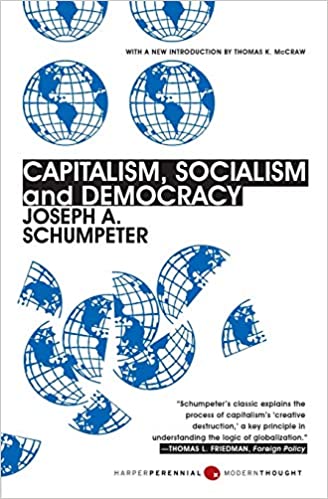
In 2018, I wrote about the 25th anniversary of the publication of Peter Drucker’s wide-ranging collection of writings, The Ecological Vision: Reflections on the American Condition. The book, with contents drawn from many different years on a dazzling variety of subjects, is partly a showcase for Drucker’s synthesis of his eclectic reading habits. I’ve compiled the following list of 29 books cited in the index; some of which are classics, some fairly obscure, and some that I had never heard of until I read Drucker’s book:
Henry Adams: Democracy, An American Novel
Saint Thomas Aquinas: The Summa Theologica
Saint Augustine: Confessions
Julien Benda: The Treason of the Intellectuals
Adolf A. Berle & Gardiner C. Means: The Modern Corporation & Private Property
James Burnham: The Managerial Revolution
John Calvin: Institutes of the Christian Religion
Dante Alighieri: The Divine Comedy
Edward J. Flynn: You’re the Boss: The Practice of American Politics

Mary Parker Follett: Dynamic Administration
Edward T. Hall: The Silent Language
F.A. Hayek: The Road to Serfdom
Shintaro Ishihara: The Japan That Can Say No: Why Japan Will Be First Among Equals
Henry James: The Princess Casamassima
John Maynard Keynes: The General Theory of Employment, Interest, and Money
Soren Kierkegaard: Edifying Discourses
Machiavelli: The Discourses
Sir Henry Maine: Ancient Law

Oskar Morgenstern: On the Accuracy of Economic Observations
Chie Nakane: Japanese Society
Plato: Phaedo
Edwin O. Reischauer: The Japanese
Robert Rosenblum: Modern Painting and the Northern Romantic Tradition: Friedrich to Rothko
W.W. Rostow: The Stages of Economic Growth: A non-Communist Manifesto
Arthur M. Schlesinger, Jr.: The Age of Jackson
Joseph A. Schumpeter: Capitalism, Socialism and Democracy
Murasaki Shikibu: The Tale of Genji
Alexis de Tocqueville: Democracy in America
Alfred North Whitehead and Bertrand Russell: Principia Mathematica
Although it’s difficult to provide bite-sized excerpts from Drucker’s comments about these books, especially since they are not book reviews, here are seven quotes in context:
Democracy in America:
The term “social ecology” is of my own coinage. But the discipline – and I consider it a discipline – boasts old and distinguished lineage. Its greatest document is Alexis de Tocqueville’s Democracy in America.
Dynamic Administration:
That perception is conditioned by what we are capable of perceiving was realized forty years ago by the most quoted but probably least heeded of all students of organization, Mary Parker Follett, especially in her collected essays, Dynamic Administration.
Edifying Discourses:
It is no accident that the only part of Kierkegaard’s tremendous literary output that did not originally appear under a pseudonym but under his own name was the Edifying Discourses.
Japanese Society:
The best-known—and best—book on Japanese social organization and institutions, Japanese Society by Chie Nakane, depicts the ie, the community of the clan or tribe, as the organizing reality within which the individual exists as a member rather than as a person.
Modern Painting and the Northern Romantic Tradition: Friedrich to Rothko:
A distinguished historian of modern Western painting, Robert Rosenblum, in his Modern Painting and the Northern Romantic Tradition: Friedrich to Rothko, asserts that modern Western painting has its roots in the northern, mostly North German, painters of the nineteenth century—Caspar David Friedrich and Otto Runge—who shifted from description to design.
Summa Theologica:
The towering achievement of the high Middle Ages in the West was Thomas Aquinas’ Summa Theologica, perhaps the boldest conceptual and analytical feat in human history.
The Tale of Genji:
The proudest achievement of Japan’s “Middle Ages,” the eleventh century, is the world’s first novel, Lady Murasaki Shikibu’s Tale of Genji, filled with intimate descriptions of men and women in court life, of love and illness and death.
To get the full effect of the authors and books cited, the complete index is accessible via Google Books. Better yet, get a copy of The Ecological Vision and marvel at how Drucker weaves these references into his perceptive and always-interesting essays and articles.
